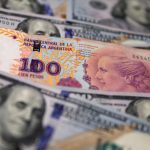
BUENOS AIRES (Reuters) -Argentina’s black market peso exchange rate weakened a sharp 5.6% on Wednesday to a record low of 1,250 per dollar, with its gap to the official rate widening above 50%, underscoring renewed pressure on the embattled currency.
The South American country is battling inflation over 200%, which saps savings and makes peso assets less attractive. The official peso exchange rate near 819 pesos per dollar, devalued sharply last month, is propped up by strict capital controls.
Analysts said that a crawling peg that sees the peso weakened officially some 2% each month was not enough to keep up with the high inflation, causing the exchange rate gap to widen, even if remains far narrower than before December’s devaluation.
A move to allow importers to settle newly-issued Bopreal bonds via parallel currency markets to access foreign currency also put pressure on the peso, traders said.
Argentina’s new libertarian President Javier Milei, currently in Davos, is battling to fix the country’s worst economic crisis in decades, with triple digit inflation, foreign currency reserves running dry and a looming recession.
The grains producing country has had multiple parallel exchange rates since 2019 when currency controls were imposed to try to halt a flight from the peso and preserve the supply of dollars. The gap has been as wide as 200% in the last year.
To read the full article, Click Here

